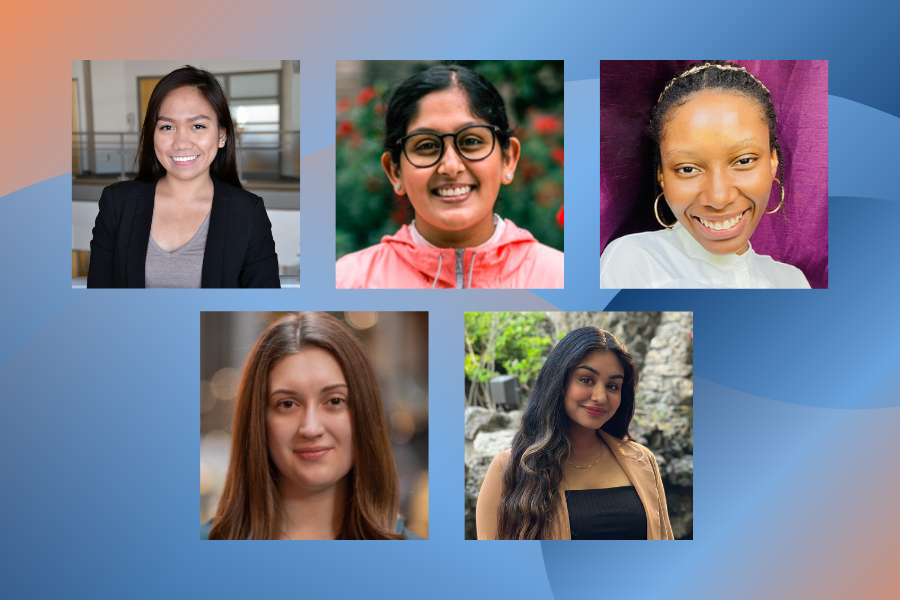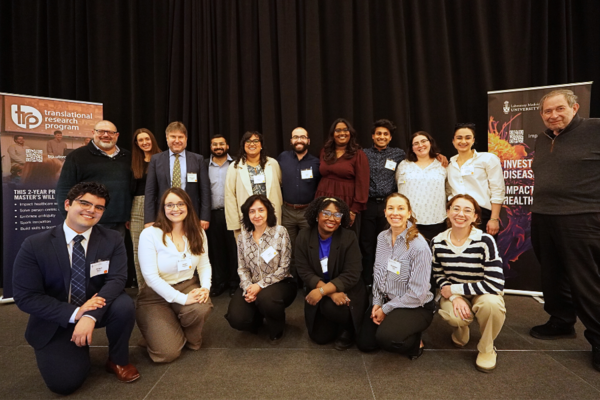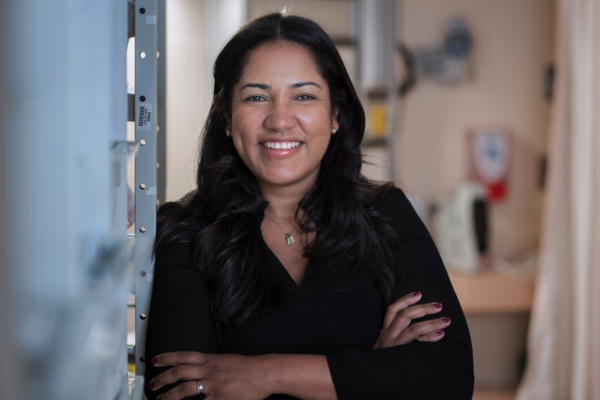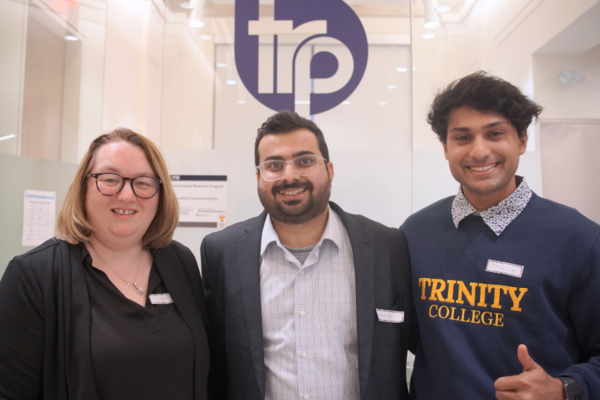Breadcrumbs
- Home
- News & events
- News
- TRP Students Receive the 2022 SCAGO Young Researchers’ Award
TRP Students Receive the 2022 SCAGO Young Researchers’ Award

The Sickle Cell Awareness Group of Ontario (SCAGO) continues its long-standing tradition of prioritizing the improvement of the health and quality of life of all individuals and their families affected by sickle cell disease through innovative research. To continue making strides towards this goal, each year they award a grant to a sickle cell disease-related research project led by bright-minded students through their Young Researchers’ Award Program.
This year, the 2022 Young Researchers’ Award recipients are a team of our groundbreaking TRP students Geil Astorga, Fairuz Karim, Peola Ellis, Janine Noorloos, and Jaspreet Randhawa for their project titled ‘Sickle Cell Disease Management, Advocacy Guide, and Resources for Transitioning Youth (SMART)’
Their research will focus on the challenges that patients with sickle cell disease face when transitioning from pediatric care to adult care centers. A lack of shared-decision making, family or caregiver involvement, and self-care skills are all among the difficulties that patients may experience when undergoing this transition.
To address these challenges, their goal is to develop the Sickle Cell Disease Management Advocacy, and Resources for Transitioning Youth (SMART), which will integrate family cantered care and reduce barriers to care by raising awareness and knowledge on disease management.
We spoke to our winning team about their journey, the experiences that won them this grant, and their future aspirations. Read on to learn more about SMART and why this award matters.
Our story
"We first started working together in the Knowledge Translation (KT) & Community module last Fall 2021, where we initially thought about creating a SMART Health App for youth with Sickle Cell Disease (SCD). Patients with SCD often experience excruciating pain due to red blood cells taking on a sticky sickle cell shape and clumping together, which blocks oxygen flow throughout the body. Supports are mostly available for pediatric patients; however, those resources are often gone once they reach adulthood. As a result, youth with SCD have often reported feeling unprepared to manage and self-advocate for their health. An unsuccessful transition may lead to more chronic conditions or worse, fatality. Our goal is to create a digital resource for youth with SCD transitioning from pediatric to the adult healthcare system with a focus on patient- and family-centered care.
As part of the course, we completed an environmental scan of SCD transition in Canada and the US, developed a brand guide for the app, produced a promotional video highlighting the app features, and created a low-fidelity prototype of the App interface (log-in page, resource page, profile page, and location page). We also established a partnership with Serena Thompson, an SCD advocate. We met her at the Foundations class, and she inspired us to do work in SCD, hence the project focus.
We continued our project through the Student Work and Research Module (SWARM) in the Winter of 2022. During this time, we connected with Karen Fleming from North York General Hospital (NYGH) who introduced us to their Sickle Cell working group. In addition, we also drafted an REB application, survey questions, and focus group questions that we thought would help us move forward with the capstone project.
On February 28th, 2022 we applied for the Young Researchers Award of the Sickle Cell Awareness Group of Ontario. We received the award on April 28th, the same day our team member Jaspreet presented our research poster at the LMP Research Conference (we were there to support).
Throughout our journey, Drs. Raza Mirza and Christopher Klinger have been very supportive of our team and project. They helped us move forward at every stage, encouraged us to continue with our work, and even reviewed our submission for the LMP conference. Furthermore, Dr. Joseph Ferenbok, Director of the Translational Research Program has been an incredible supervisor who has provided his mentorship while reviewing our protocol & application to the Young Researchers Award.
As for the project, we decided to take a step back this summer upon further discussion with Dr. Ferenbok during our studies in the Translational Thinking module. One of the core aspects of the TRP is not ‘solution-jumping’, but understanding the problem thoroughly to provide the best possible intervention(s). There are existing interventions and technologies for youth with SCD, yet what can we learn from them and how can we translate research findings into beneficial outcomes for patients? Hence, we thought about connecting again with our community partners and expanding our partnerships to learn more about the problem space and the specific needs of our patients. In addition, we are exploring the co-design process that we hope to apply in our capstone project. This method builds on the concept of partnering and collaborating with key stakeholders in research rather than engaging with them as research participants.
Our vision
Our goal is to help support patients with SCD and their families during the transitionary period moving from pediatric to adult health care centers. We want to ensure patients and their families are well-equipped with resources and knowledge to become more transition ready and empowered in their healthcare plan.
Why we chose to work in this area
The project started with Geil’s pitch in KT and the Community class to form a team focused on patient and family-centered care. Her work in knowledge translation and family-centered care at CanChild Centre for Childhood Disability Research inspired her to propose developing a website that can help guide clinicians and family members in navigating family-centered care.
After the team came together with a passion for focusing on patient- and family-centered care, we had a patient advocate for SCD, Serena Thompson, attend our Foundations class. Serena shared her struggles with transitioning from pediatric to adult care, finding resources and support organizations, and the health inequalities present when seeking SCD treatment and management. She shared having to ‘dress up and look presentable before going to the Emergency Department, even if she is in so much pain, to make sure she is treated right. At times, she needs a friend to advocate for her during a pain crisis since not a lot of care providers are aware of SCD. A lot of services also stopped once she reached adulthood, and she was left to figure everything out with little to no support.
The challenges Serena has faced as a patient with SCD navigating the healthcare system inspired Jaspreet to pitch narrowing the team’s focus to SCD treatment and management to help make a difference in the lives of patients with SCD and their families. The team was extremely enthusiastic and passionate to focus on SCD and learn more about Serena’s experiences.
Peola’s area of interest is the application of nanotechnology in medicine. However, when she heard Geil’s pitch and Serena Thompson’s story about health inequity in the Emergency Department as a Sickle Cell Disease (SCD) patient; Peola felt that there was a gap that needed to be addressed between the lack of clinician knowledge of SCD and appropriate patient treatment. Fairuz was also incredibly inspired by Serena Thompson’s stories and the advocacy work that she has been doing within the space. Fairuz is passionate about health equity, intersectionality, the social determinants of health, and participating in community-level change. She has been excited to be part of the team and in working in this area because of her desire to be a part of interventions and change for a more equitable healthy society. Janine’s social services and healthcare background sparked her interest in methods to empower people with lived experience. She is looking forward to exploring how family-centered care can be used alongside a co-design process to better support people with SCD.
Jaspreet is interested in leveraging her background in health sciences and applied computing to create innovative interventions to improve healthcare, especially in the fields of pediatrics, cardiovascular, and reproductive health. Jaspreet has developed a passion, alongside a need, to bridge the gap between research and knowledge to improve patient care and empower our communities by partnering with our patients and stakeholders. Jaspreet is excited to be adapting and adopting the experience-based co-design methodology for the SMART project.
The project may have evolved when compared to the initial pitch—but this is the TRP approach in action. We reached out to key stakeholders and explored possibilities with them. Geil is thankful for the opportunity to do something to help patients with SCD. This project is at the core of why she joined the TRP, bridging her background in strategic communications and multimedia design with translational research to create an impact in people’s lives.
We scheduled a meeting with Serena Thompson and began our journey in this space without even realizing the impact this conversation could bring. Our conversations with Serena provided us with the expertise, knowledge, and guidance to explore the problem space and discover gaps. Moving forward with our project, we would like to engage in experience-based co-design processes to support patients with SCD and their families during the transitionary period moving from pediatric to adult healthcare centers. We need to expand our partnerships with patient advocates and experts to co-create and co-design our interventions. Our relationship with Serena as a partner has been pivotal to our project and we are hoping to expand that partnership in a structured manner.
Future direction for this innovation
We will continue to work on this as our capstone project next year, with the support of our supervisors and advisory committee as well as sponsorship from the Sickle Cell Awareness Group of Ontario.
The TRP is proud of this team’s incredible work so far. We’d like to congratulate Geil, Fairuz, Peola, Janine, and Jaspreet on this wonderful achievement and wish them all the best in their future endeavours.



